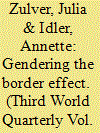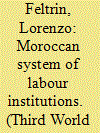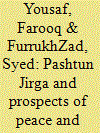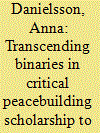|
|
|
Sort Order |
|
|
|
Items / Page
|
|
|
|
|
|
|
| Srl | Item |
| 1 |
ID:
171939


|
|
|
|
|
| Summary/Abstract |
International monetary organisations argue the ‘developing countries’ should foster linkages to the world economy as a means to overcome backwardness. In this article we refute the narrative that Mexico has experienced industrial upgrading. Rather, industrial growth in Mexico over the last 40 years has been shaped by neoliberal economic policies which have turned the Mexican economy into an export-led manufacturing platform designed to supply the North American market, sustained by a precarious labour market. As a result, Mexico occupies the most labour-intensive and low value-added segments of regional production chains. To make this argument, we perform an in-depth analysis of the Mexican automotive industry, demonstrating that instead of being an engine for domestic industrial development, the auto industry has become a dominant economic sector through productive hyper-specialisation concentrated in the northern Mexican border states, a reliance on transnational capital, particularly from the United States, a disconnect with domestic markets, and the super-exploitation of labour.
|
|
|
|
|
|
|
|
|
|
|
|
|
|
|
|
| 2 |
ID:
171936


|
|
|
|
|
| Summary/Abstract |
While debates continue about China’s role in sub-Saharan Africa, there is growing consensus that China is a different kind of development partner. One distinct feature of Chinese partnerships is that they include support for the tobacco industry, a sector other donor states and institutions shun. Not only is tobacco a primary agricultural export in a number of Africa states, the state-owned Chinese National Tobacco Corporation is the largest tobacco company in the world. This paper analyses Chinese support for the tobacco industry in three states – Zimbabwe, Malawi and Zambia – documenting how co-operation is shaped by Chinese state capitalism and assessing the development and governance implications. Following an introduction situating the analysis within the context of China–Africa co-operation and tobacco’s global value chain, Chinese engagement in each country is analysed. Findings indicate that, despite differences across case studies in terms of development outcomes, common governance implications are apparent. African elites initiated tobacco-related co-operation to meet their interests, but Chinese interests dominated implementation. Consequently, Chinese investments have maintained hierarchal governance of an exploitive and harmful industry. Analyses of Chinese African co-operation need to move beyond public–private paradigms and interrogate the nuances of Chinese state capitalism in Africa.
|
|
|
|
|
|
|
|
|
|
|
|
|
|
|
|
| 3 |
ID:
171933


|
|
|
|
|
| Summary/Abstract |
The emphasis on local or hybrid efforts in peacebuilding literature brings front and centre the importance of being rooted within a particular context, with leadership and vision for social change and justice proffered by local actors. This is the same emphasis found in development literature and a necessary foundation for transformation. Scholars and practitioners nevertheless also note a role for outsiders in supporting local efforts (eg Lederach in 2005). Yet a significant challenge arises for outsiders, and to some extent local actors: how do you know what was tried or is underway that you might support or from which you might learn? This paper reports findings from a collaborative research project that examined the gap between the practice of peacebuilding locally and internationally available ‘knowledge’ via publications produced on local peacebuilding in Jos, Nigeria, between 2001 and 2008. It identifies a staggering gap between efforts and knowledge in the form of publications. The paper discusses the implications of the findings in terms of what it means for outsiders when thinking about helping resource local transformation efforts.
|
|
|
|
|
|
|
|
|
|
|
|
|
|
|
|
| 4 |
ID:
171934


|
|
|
|
|
| Summary/Abstract |
In the Colombian–Venezuelan borderlands, the reconfiguration of armed group presence and mass migration create and reinforce conditions of high violence and risk. Against this backdrop, we ask: What are the gendered security implications of the double crisis in the borderlands? Based on fieldwork in four regions along the border, this article argues that the border effect is gendered; the very factors that coalesce to produce this effect exacerbate existing gendered power dynamics, particularly as these relate to gender-based violence. Accordingly, this article demonstrates the specific ways in which the border – as a facilitator, deterrent, magnet and/or disguise – reinforces experiences of gendered insecurity in this region. The article finishes by outlining the implications for other international borderland settings.
|
|
|
|
|
|
|
|
|
|
|
|
|
|
|
|
| 5 |
ID:
171935


|
|
|
|
|
| Summary/Abstract |
In many post-war countries, the relative security brought to rural areas is construed by government officials and business actors as an opportunity for development. This is particularly true for marginal areas, where opportunities for economic development had previously been hindered by the threat of violence. This provides a favourable context for the construction of commodity frontiers. Through the case of Colombia, I show that one of the main challenges faced by frontier policy narratives amounts to differentiating wartime dispossession from peacetime legitimate accumulation. This poses intractable challenges to policymakers and business actors, as it fuels the contradictions between peace consolidation and post-war development.
|
|
|
|
|
|
|
|
|
|
|
|
|
|
|
|
| 6 |
ID:
171940


|
|
|
|
|
| Summary/Abstract |
The relevance of workers’ mobilisations in the 2011 Arab uprisings and – more recently – in the Algerian movement for democracy and social justice has encouraged a renewed interest in labour–state relations in the region. This article presents a class-based perspective on labour institutions, taking Morocco as a case study. In contrast to institution-based approaches, this research argues that it is problematic to treat the trade unions as analytical proxies for the working class, because this heuristic move conceals how class struggles – from below and from above – can transcend and transform labour institutions. The article proposes a framework to study labour–state relations, highlighting the relative autonomy of union officials from workers and vice versa. In this way, it shows how, in the neoliberal phase, the Moroccan state increased inducements to the unions while decreasing those to the workers and maintaining significant constraints on workplace organising. To use a simplified formulation, the regime included the unions to exclude the workers. In such a context of low union representativeness, the dangers of reducing the working class to the trade unions emerge clearly.
|
|
|
|
|
|
|
|
|
|
|
|
|
|
|
|
| 7 |
ID:
171938


|
|
|
|
|
| Summary/Abstract |
There is growing recognition and appreciation of traditional approaches towards peace and conflict resolution across the world. This article aims to highlight the crucial role and consequential importance of traditional mechanisms of peace and conflict resolution in Pakistan’s terror-hit Pashtun ‘tribal’ areas, formerly known as the Federally Administered Tribal Areas (FATA). These ‘peripheral’ areas of Pashtun tribes stand in relative isolation from the ‘centre’ of the Pakistani ruling establishment. Moreover, with the onset of militancy since 2001 in the Afghanistan–Pakistan region, the situation has turned worse for the local Pashtun tribes. The article discusses the changing role of traditional mechanisms and local structures of peace and conflict resolution, arguing that colonial legacies have failed to prevent, manage, resolve or transform conflicts in post-colonial states such as Pakistan. Furthermore, the Pashtun cultural code of Pashtunwali, along with its various tenets and structures, especially Jirga (Pashtun tribal council) and Lashkar (tribal militia), is also discussed in the article. The article concludes that the changing socio-political situation, along with the rise of the secular Pashtun Tahafuz Movement (PTM), is presenting a challenge to ‘tribal’ Pashtun patriarchal values as well as traditional structures like Jirga in the region.
|
|
|
|
|
|
|
|
|
|
|
|
|
|
|
|
| 8 |
ID:
171937


|
|
|
|
|
| Summary/Abstract |
Scholarly consensus postulates a sharp contrast exists between liberal values and realist interests in US foreign policy in the Middle East and North Africa (MENA) region, which finds its expression in the ‘security–democracy’ dilemma. This means the US rhetorical determination to abide by the values of a ‘liberal’ foreign policy is neutralised by the ‘realist’ priority of maintaining US strategic interests, which requires support for friendly authoritarian rulers. Scholarship tends to apply this reasoning indistinctly to the entire region, providing an encompassing framework of analysis for understanding US foreign policy, which is valid across time and space. This study challenges this theoretical assumption and argues that while the US might indeed have a comprehensive regional approach in the MENA, the resulting foreign policy follows country-based trajectories that respond to national specificities and the perceived implications for US strategic interests. Exploring US foreign policy in the MENA after 9/11, the article demonstrates that while the US emphasis on liberalism crumbled when faced with security issues, the US liberal approach to Tunisia unfolded more consistently. Although the US continued formal cooperation with Ben Ali’s regime, it empowered at the same time a coalition of democratic opponents, solving the security–democracy dilemma and positively influencing the Tunisian democratisation.
|
|
|
|
|
|
|
|
|
|
|
|
|
|
|
|
| 9 |
ID:
171932


|
|
|
|
|
| Summary/Abstract |
In light of the recent turn to ‘inclusivity’ in peacebuilding practice, this article problematises established ways of ‘doing critique’ in peacebuilding scholarship. Inclusivity refers to the building of peace as a situated and co-constituted process. This entails what can be termed a new epistemic commitment: the acknowledgement that peacebuilding as a dynamic and emergent phenomenon is also an epistemically co-constituted process. In the article, I make two arguments. First, the move towards inclusivity places currently dominant modes of scholarly critique at an impasse. Persistent ontological and epistemological binaries preclude a productive investigation and challenging of inclusivity projects and their epistemic commitment. Second, I argue that, by returning to historical conditions that were formative in the very emergence of the category of ‘the local’, the conceptual basis of an alternative mode of critique (re)appears. This alternative critical project allows for an analytical sensibility to peacebuilding as emergent and adaptive. It makes it possible to disentangle power relations as these emerge between different and possibly unexpected configurations of actors and knowledge claims in inclusivity projects
|
|
|
|
|
|
|
|
|
|
|
|
|
|
|
|
|
|
|
|
|